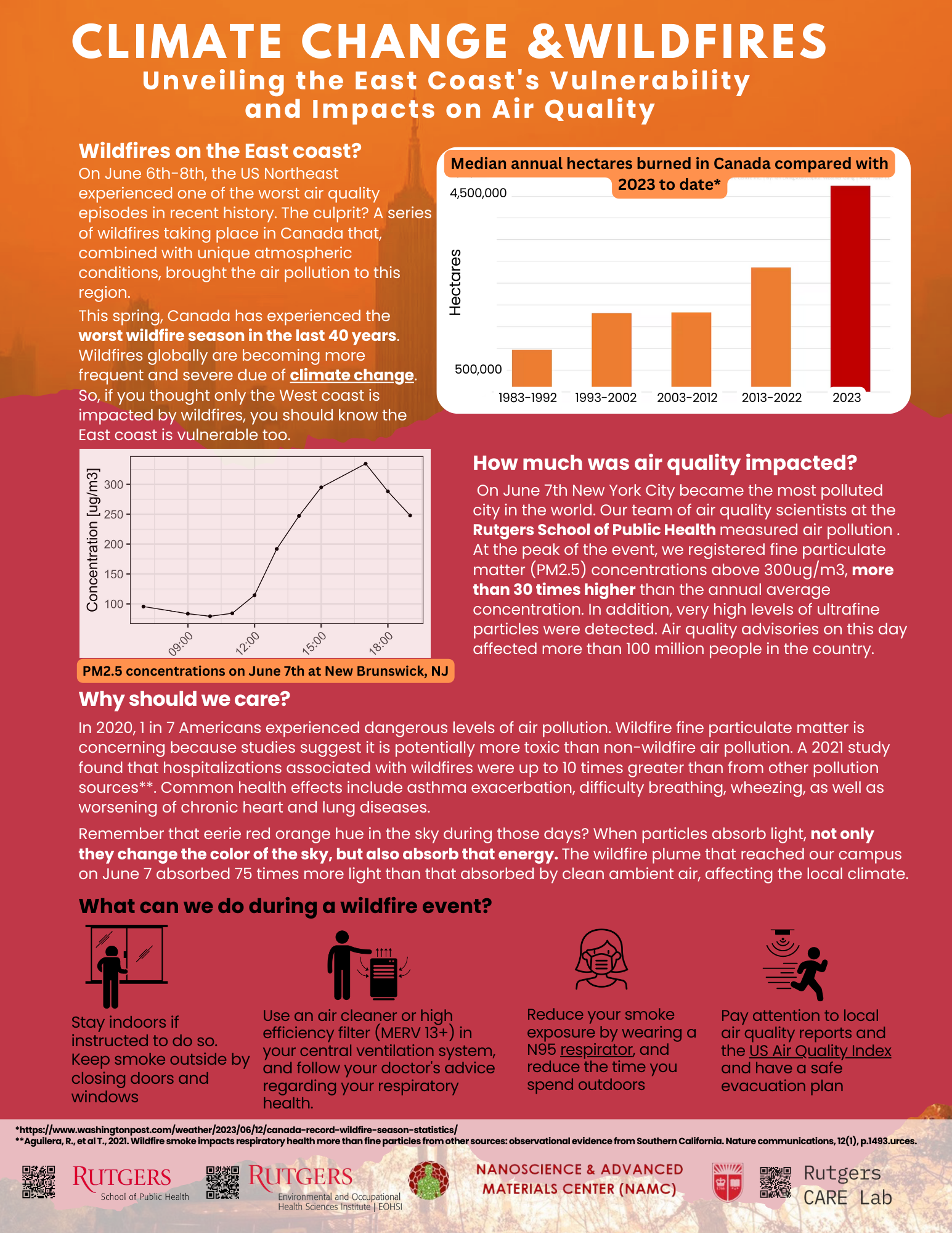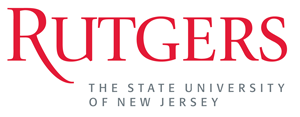June 28, 2023
NAMC Faculty, post-doctoral research fellows and students completed an unprecedented measurement campaign to characterize the physicochemical properties of wildfire air pollution and launched a number of pilot projects to assess the impact on public health.
The faculty team includes Dr. Philip Demokritou, Henry Rutgers Chair and Professor in Nanoscience and Environmental Engineering, and Director of the NAMC and the Division of Environment and Population Health Biosciences at EOHSI, Dr Georgios Kelesidis, Assistant Professor and NAMC Deputy Director, and Dr. Memo Cedeño Laurent, Assistant Professor and Director of Rutgers CARE Lab. The team collected size-fractionated particulate matter samples throughout the wildfire event for physicochemical and morphological characterization. Simultaneously, real-time measurements were taken to monitor the fluctuating levels of air pollutants, providing a comprehensive picture of the wildfire’s impact on air quality. More importantly, the team launched a number of collaborative toxicological projects with investigators at EOHSI and across Rutgers and with Harvard Medical School and Brigham and Women’s Hospital in Boston MA. Such project will enable the assessment of air pollution from this event on cardiovascular and respiratory diseases as well as on women’s health.
“Unfortunately, environmental issues have no boundaries, and we expect to see an increase in the frequency and intensity of wildfires in the northeast due to climate change. Assessing the impact of such climate driven events on health is of great importance and will help our society to prepare and adapt. I am impressed with the enthusiasm of our faculty, post docs and students, and the transdisciplinary research projects across the exposure-disease continuum initiated across Rutgers and in collaboration with other academic Institutions such as Harvard Medical School and the University of South Carolina” said Dr Philip Demokritou, NAMC Director.
“The wildfires in Canada gave us a sobering demonstration of the climate change impacts on air quality” said Dr. Memo Cedeño Laurent. On Wednesday, June 7, the peak of the incident, the average PM2.5 concentration from 3 to 7 pm was 330 μg/m3, akin to the second-hand smoke in bars before smoking bans and way above the 35 μg/m3 level of National Ambient Air Quality Standards. These results underscore the potential health risks associated with wildfire incidents, particularly for vulnerable populations such as the elderly and those with pre-existing respiratory conditions.
The samples collected during this campaign are currently under analysis to understand their physical and chemical composition. They will prove instrumental in the realization of toxicological studies that contribute to the broader scientific understanding of the impacts of wildfires on human health. A number of projects on assessing the toxicological properties of the particulate matter collected during the incident have been initiated and data from those projects will shade light on potential risks on disease development.
In addition to the health effects, wildfire smoke can also exacerbate climate change. Dr. Georgios Kelesidis is currently studying how particulate matter from wildfires increase the light absorption in the atmosphere, leading to further temperature increases and comparing the effect of particulate matter from such incidents to other greenhouse gases such as CO2 and methane. According to Dr. Kelesidis: “The wildfire plume that reached our campus on June 7 at about 3-4 pm absorbed 75 times more light than that absorbed by clean ambient air affecting the local climate.”
Data collection efforts were conducted by Rutgers SPH Post-Doctoral Fellows Dr. Hooman Parhizkar, Dr. Denisa Lizonova, Dr. Costas Bekris, and Doctoral Candidate Leonardo Calderon.
Rutgers EOHSI and NAMC are committed to continuing its research on climate driven wildfire air pollution and its impacts on human health. The team plans to publish their full findings in several peer-reviewed scientific papers in the coming months.
The Environmental and Occupational Health Sciences Institute (EOHSI) at Rutgers University is a leading research institution dedicated to understanding how environmental and occupational exposures impact human health. Through innovative research, education, and community outreach, EOHSI works to improve public health and the environment.
Copyright © 2023, Rutgers, The State University of New Jersey


